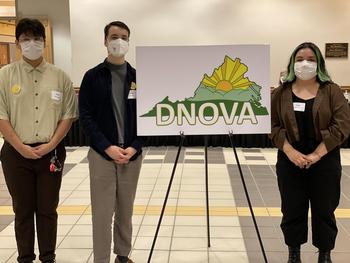Amid the complex challenges facing our world, now is a crucial time for young people to apply their talents toward building the future. As a leader in research innovation and civic engagement, George Mason University prepares students to explore actionable solutions to political, economic, environmental, and more global challenges. The Next System Fellows Program is an inquiry-based, experiential learning opportunity for students eager to build a more just and sustainable global order for the future.
The Next Systems Fellows Program introduces Mason students to the emerging field of Next System Studies, connecting them with community changemakers working right now on alternative systems. Next System Studies is an interdisciplinary academic field that brings together scholars and practitioners committed to reconstructing our economy, legal system, politics, and culture at local and global scales. In seeking a more just social order, the field prioritizes empowerment of marginalized communities and democratization of decision-making processes.
Dr. Ben Manski, faculty lead for the Next System Fellows Program and Assistant Professor of Sociology, emphasizes the importance of bringing Next System Studies to Mason students: “We connect students with transformative community initiatives to both aid the initiatives directly through engaged research and the labor power of students as workers, but also to better equip students to move on to become leaders in building Next System initiatives.”
Through the program, students will spend the Spring semester asking questions, learning theories, applying methods, and closely examining real-life cases, while contributing to local efforts. The program prepares participants for future careers leading change in their respective fields. In fact, Next System fellows are among some of the first around the world to be actively exploring the area, a testimony to Mason’s ranking among the top 10 universities nationally for innovation. Living in a center of the global political economy like the D.C. metropolitan area, Manski explains, fellows are well positioned to apply knowledge and skills for building our futures.

The program follows the cohort model of all Arlington Fellows Programs: a cohort of 15 to 25 students will enroll in four courses totaling 15 credits. These courses orient students to Next System Studies, probing system designs, system change, and systemic movements, all in a small seminar environment where peer fellows build close relationships.
Fellows will pursue an internship with a partner engaged in Next System work, bolstering their professional development with hands-on collaborative learning. Partners are drawn from a variety of different nonprofits, NGOs, and advocacy groups, including national organizations CODEPINK, Public Citizen, local organizations like the Virginia Solidarity Economy Network, and Next System’s very own Democratizing NOVA.
Spring 2022 Next System alum and Honors College student, James Condo, found this dimension of the program especially rewarding. “During my college career,” he recounts, “I had this deep-seated conviction that the system that we live in is not sustainable, and I wanted to do something about it, but a lot of the humanity’s problems felt completely insurmountable.”
Learning about the Next System Fellows Program, then, was an answer to his urge to take action. “I saw Next System Studies as a much more hopeful field. I wanted to see if there was an alternative to our system, what that would practically look like, and what the practical implementation of a next system would actually be.”
As a fellow, Condo interned with Democratizing NOVA (DNOVA), an original community-engaged research project of Next System Studies at Mason that connects multiple pro-democracy initiatives in the region. In addition to a group project creating a database of Northern Virginian democratization–with over 150 initiatives identified so far–Condo developed an individual research project on cooperatives in Northern Virginia. Through the internship and the research project, Condo was exposed to many organizations effecting change locally, an experience that has since shaped his academic and career interests. Condo has continued beyond the program serving as the Next Systems Communications Specialist, which involves managing their social media and a newsletter that reaches Next System scholars and practitioners around the world.
“For those who are from here, or who intend to stay here, they can think about the Next Systems Fellows Program as a route to creating a new identity and purpose for this region–being involved in setting the future for Northern Virginia, instead of having it set for you. They can become part of building their own future and the world they are going to inhabit,” Manski says.
From community collaborations to organizing workshops, plenty exciting opportunities are in store for the Spring 2023 cohort. Those interested in the field should also look out for a Next System minor, available in the near future. Apply to be a fellow today!
